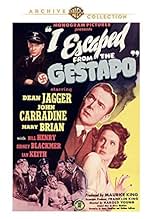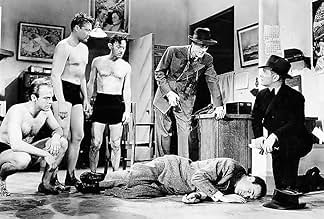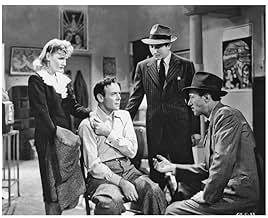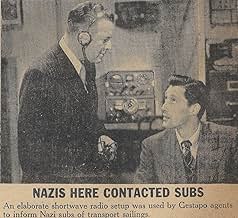Ajouter une intrigue dans votre langueA forger is forced to work for a Nazi spy ring. His conscience gets the better of him, though, and he secretly conspires with the FBI to turn over the gang.A forger is forced to work for a Nazi spy ring. His conscience gets the better of him, though, and he secretly conspires with the FBI to turn over the gang.A forger is forced to work for a Nazi spy ring. His conscience gets the better of him, though, and he secretly conspires with the FBI to turn over the gang.
- Réalisation
- Scénario
- Casting principal
William Henry
- Gordon -
- (as Bill Henry)
Anthony Warde
- Lokin
- (as Anthony Ward)
William Marshall
- Lunt
- (as Billy Marshall)
George 'Spanky' McFarland
- Billy
- (as Spanky McFarland)
Charles Wagenheim
- Hart
- (as Charles Waggenheim)
Jack Chefe
- Arcade Patron
- (non crédité)
Frances Farmer
- Woman in Montage Sequence
- (non crédité)
William Frambes
- Sailor at arcade
- (non crédité)
Arthur Gardner
- FBI Man
- (non crédité)
Dick Gordon
- Board Member
- (non crédité)
Avis à la une
Dean Jagger stars in this wartime cheapie from Monogram as a forger of some
reputation. The Gestapo which has set up some American headquarters at an
amusement park arranges for Jagger's escape and they even cover up his escape
by putting another body on railroad tracks with his ID.
So without the authorities looking for him, Nazi agents John Carradine and Sidney Blackmer set up a print shop where Jagger can counterfeit currency of all kinds for many countries. This is part of a Gestapo diversity program, they do all kinds of dirty work from this headquarters. But Carradine and Blackmer are mostly into sabotage.
Of course Jagger realizes he's a patriotic American at some point and starts sabotaging the saboteurs. I think you know where this is heading.
It is amazing some of the wild stuff that was put into WW2 era films of that era. Especially from the poverty row studios like Monogram.
Claptrap typical of the times.
So without the authorities looking for him, Nazi agents John Carradine and Sidney Blackmer set up a print shop where Jagger can counterfeit currency of all kinds for many countries. This is part of a Gestapo diversity program, they do all kinds of dirty work from this headquarters. But Carradine and Blackmer are mostly into sabotage.
Of course Jagger realizes he's a patriotic American at some point and starts sabotaging the saboteurs. I think you know where this is heading.
It is amazing some of the wild stuff that was put into WW2 era films of that era. Especially from the poverty row studios like Monogram.
Claptrap typical of the times.
Dean Jagger is a forger -- in the United States, not Europe. A gang led by John Carradine and Sidney Blackmer break him out of prison, kill some one to convince the authorities Jagger is dead, then hide him behind the scenes at a funfair, where they have him forge things. It soon dawns on Jagger that they're not gangsters looking for someone who can produce fake currency that will pass. They're Nazi spies, trying to inflate the US and neutral countries into bankruptcy, and blow up stuff in the US. Jagger hates being cooped up, and he comes to appreciate freedom in a way he never did before.
It's a production of the King Brothers as they worked they way up from awful movies to ones that look like they have something more to say than "this is a story". I'm not sure if they do, but they certainly give the impression of something more important, with some fine performers, including Mary Brian and Ian Keith, and wild sets that suggest something other than what they show: the blank walls and discarded machinery of the fun fair, the strange, huge metallic shapes of an oil refinery. Releasing, as they did, through Monogram, I'm sure they didn't spend much money, but DP Ira Morgan certainly knew how to shoot things dramatically, and director Harold Young, while never out of the B movies, knew how to let the actor, dialogue, and images carry things along. Perhaps that's the subtext of this story: do your job right, and it will all come out well in the end.
It's a production of the King Brothers as they worked they way up from awful movies to ones that look like they have something more to say than "this is a story". I'm not sure if they do, but they certainly give the impression of something more important, with some fine performers, including Mary Brian and Ian Keith, and wild sets that suggest something other than what they show: the blank walls and discarded machinery of the fun fair, the strange, huge metallic shapes of an oil refinery. Releasing, as they did, through Monogram, I'm sure they didn't spend much money, but DP Ira Morgan certainly knew how to shoot things dramatically, and director Harold Young, while never out of the B movies, knew how to let the actor, dialogue, and images carry things along. Perhaps that's the subtext of this story: do your job right, and it will all come out well in the end.
The Nazi menace has spread into America. Torgut Lane (Dean Jagger) is a forger prisoner. He escapes with help from a group of Nazi spies. He is forced to help them print counterfeit bills.
This film is also called No Escape. It's wartime propaganda. The premise is far from realistic. The story is messy. Torgut is way too blasé and that saps away any tension for the first half. The audience doesn't care about this guy and there is no rooting interest. The story is too bland for too long. There is a bit of noir style. It's a B-movie but it still needs to be thrilling. Even propaganda films need to be good.
This film is also called No Escape. It's wartime propaganda. The premise is far from realistic. The story is messy. Torgut is way too blasé and that saps away any tension for the first half. The audience doesn't care about this guy and there is no rooting interest. The story is too bland for too long. There is a bit of noir style. It's a B-movie but it still needs to be thrilling. Even propaganda films need to be good.
I escaped from the gestapo. Also titled no escape. Released during world war two. When an engraver is forced to assist the nazis, his conscience gets the better of him. Dean jagger won an oscar for twelve o'clock high. Supporting john carradine, mary brian. The usual tricks of the trade, during the war. Will he ever get away from his captors? He meets a girl at the carnival, who may or may not pick up on what he's trying to tell her. It's all very low budget, world war two propaganda, but about as expected, since everyone was off fighting the war. It's not so bad. Directed by harold young, for monogram pictures. Pretty low budget stuff.
A movie that would be confined to the dustbin of low-budget history if it were not infamous as the film Frances Farmer was making when she had her breakdown and was arrested in Hollywood, soon to be institutionalized for most of the rest of the decade. The notoriously cheap King Brothers of Monogram Studios must have wanted to use every scrap of film they had shot, for they use a very brief shot of Farmer, evidently taken on the only day of filming she completed on this project, in a montage sequence. The sight of Farmer, staring at the camera with a puzzled and perhaps frightened look on her face as she pulls a shawl over her head, is unforgettable and about the only thing worth remembering about this film.
Le saviez-vous
- AnecdotesTroubled actress Frances Farmer was cast in this film in the role of "Helen", and showed up for the first day of filming, but was later fired by Monogram for allegedly slapping a studio hairdresser. She was replaced by Mary Brian. She was subsequently arrested for violating her parole from a previous drunk-driving charge. She reputedly appears in at least one montage sequence, but was essentially cut out of the finished film. This would be her penultimate picture. Her last would come 15 years later in The Party Crashers (1958).
- Citations
Torgen Lane: What do you fellas use for a heart?
- ConnexionsReferenced in Frances (1982)
Meilleurs choix
Connectez-vous pour évaluer et suivre la liste de favoris afin de recevoir des recommandations personnalisées
- How long is I Escaped from the Gestapo?Alimenté par Alexa
Détails
- Durée1 heure 15 minutes
- Couleur
- Rapport de forme
- 1.37 : 1
Contribuer à cette page
Suggérer une modification ou ajouter du contenu manquant

Lacune principale
By what name was I Escaped from the Gestapo (1943) officially released in India in English?
Répondre

































